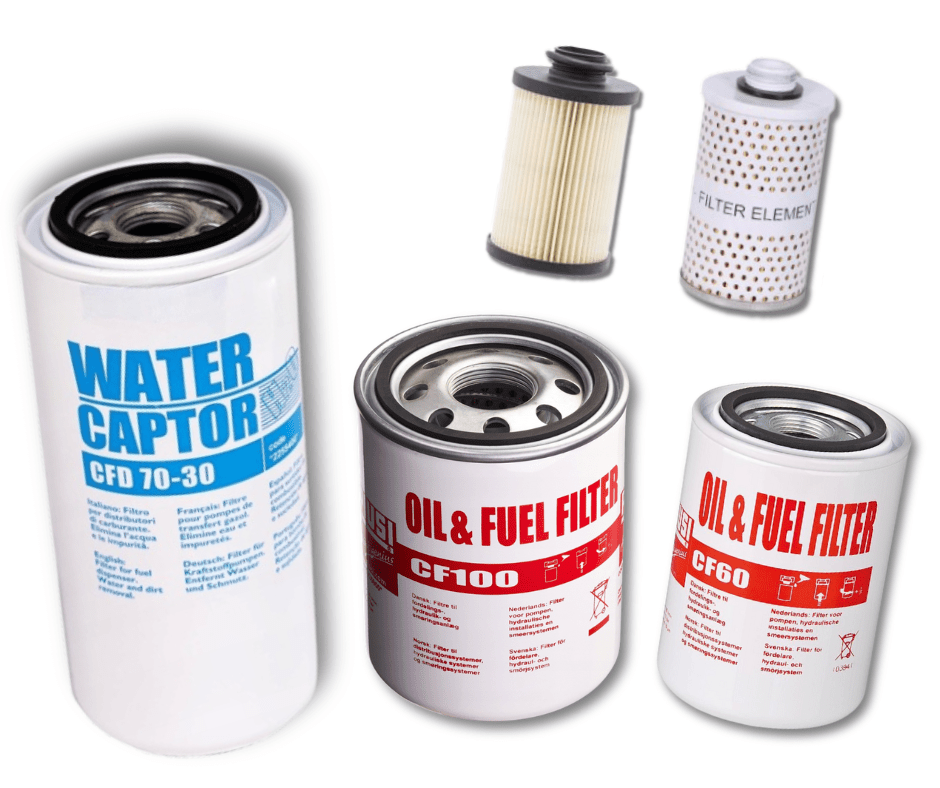Fuel Filters for PIUSI Pumps: Importance and Maintenance Schedule
Fuel filters are critical components in the efficient operation of PIUSI and all other brands of pump. Ensuring that the fuel delivered to your machinery & vehicles is clean and free from contaminants. Proper maintenance and timely replacement of fuel filters can prevent costly repairs and downtime, making it essential to understand when and how to change them.
The Role of Fuel Filters on Diesel Pumps
Fuel filters fitted to pumps are designed to remove impurities such as dirt, water and other particles from the fuel. These contaminants can cause significant damage to the engine and other components of your vehicles if not properly filtered out. By trapping these impurities, fuel filters help in maintaining optimal fuel quality, which in turn ensures the longevity and performance of the equipment.
Fitting Filters to an Existing Pump or Gravity Flow
Filters are universal fitting and can be easily retro fitted to any existing pump set up or to any gravity flow tank. To do this the filter must be supplied with the corresponding filter head which can be connected using a flange, nipple or with hose tails.
When to Change Fuel Filters
Knowing when to change your fuel filter is crucial. Here are some key indicators and guidelines to help you determine the right time for a replacement:
- Scheduled Maintenance: It is generally recommended to follow the manufacturer’s maintenance schedule. It is typically advised to check the fuel filters every 12 months. Regular maintenance helps in catching and preventing any potential issues early and keeps the pump running smoothly.
- Performance Issues: If you notice a decline in pump performance, such as reduced flow rate or increased pressure drop, it might be time to inspect the fuel filter. A clogged filter restricts fuel flow, leading to decreased efficiency and potential damage.
- Visual Inspection: Periodic visual inspections on filters with glass bowls can reveal the condition of the fuel filter. Look for signs of clogging, discoloration, or the presence of debris. If the filter appears dirty or clogged, it’s time for a change.
- Fuel Quality: The quality of fuel used also affects the lifespan of the fuel filter. Poor-quality fuel with high levels of contaminants will necessitate more frequent filter changes. Using clean, high-quality fuel can extend the interval between replacements.
What Filters Do You Need?
Filters can be easily identified with the model numbers printed on the exterior of the filter. Each filter has a maximum operating flow rate, it is important to take note of this when replacing them to ensure no restrictions are placed on the pump which can effect flow rate. There are various types of filters for different applications.
- Particle filters for sediment and dirt
- Water absorbing filters for water Absorption
- Dual particle & water filters for both of the above
- Steel mesh washable filters
- Paper element filters
- Strainer & Y brass strainer filters
- Gravity flow filters
How to Change Fuel Filters
Changing the fuel filter on both PIUSI and other brands of pump is a very straightforward process
- Turn Off the Pump: Before starting the replacement process, ensure the pump is turned off to prevent fuel spillage and ensure safety.
- Remove the Old Filter: Unscrew the old filter and dispose of it properly. Filters are normally filled with fuel so it is important to be mindful of any fuel that may spill during this step.
- Install the New Filter: Screw the new filter into place, ensuring it is secure but not overtightened.
- Check for Leaks: After installation, turn the pump on and check for any leaks around the filter.
- Test the System: Finally, test the pump to ensure it is operating correctly with the new filter in place.
Conclusion
Regular maintenance and timely replacement of fuel filters are essential for the efficient and long-lasting operation of PIUSI pumps. By understanding the signs that indicate a filter change and following a proper maintenance schedule, you can keep your equipment running smoothly and avoid unnecessary downtime and repairs. Remember, clean fuel means a more efficient pump and a longer lifespan for your machinery.

